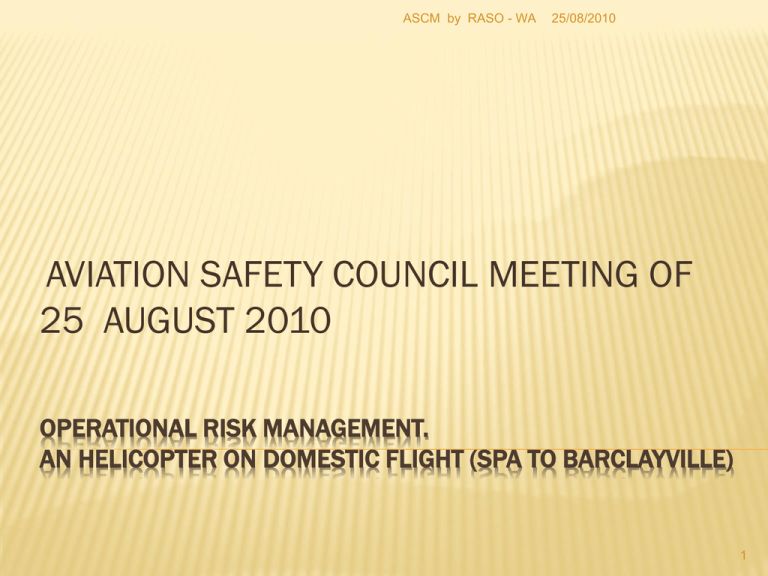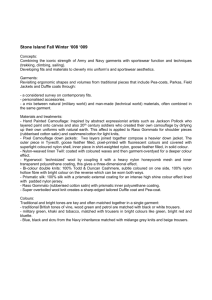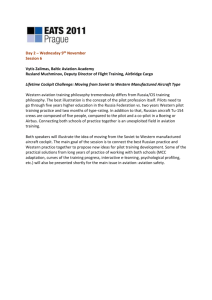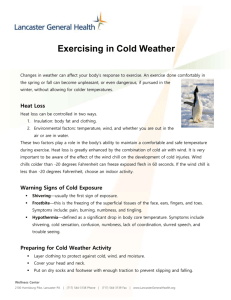ORM_Presentation_By_Dr_Julius_Ocaka
advertisement

ASCM by RASO - WA 25/08/2010 AVIATION SAFETY COUNCIL MEETING OF 25 AUGUST 2010 OPERATIONAL RISK MANAGEMENT. AN HELICOPTER ON DOMESTIC FLIGHT (SPA TO BARCLAYVILLE) 1 ASCM by RASO - WA 25/08/2010 BACKGROUND TO UN DFS / DPKO AVIATION OPERATION RISK MANAGEMENT In complying with the United Nations, DPKO and DFS Policy Directive on Aviation Operational Risk Management (ORM), dated 10 April 2008. explains the procedures to be followed in UNMIL everyday aviation activity before any flight can be executed. DPKO and DFS Aviation Operational Risk Management (Implementing Guidelines). DMS UNMIL ORM Implementing Road Map 2 ASCM by RASO - WA 25/08/2010 OPERATIONAL RISK MANAGEMENT: WHAT IS IT? A systematic process of identifying and assessing hazards in terms of risk, then implementing actions to control that risk to an acceptable level and monitoring the controls for effectiveness. 3 ASCM by RASO - WA 25/08/2010 ORM SIX STEPS The six steps in implementing Operational Risk Management (ORM), also known as Risk Management Process is: Step 1: Hazard Identification. Step 2: Risk Assessment. Step 3: Analyse Risk Control Options. Step 4: Choose Risk Control Measures. Step 5: Implement Risk Control Step 6: Supervise and Review. 4 ASCM by RASO - WA 25/08/2010 OPERATIONAL RISK MANAGEMENT PROCESS 5 ASCM by RASO - WA 25/08/2010 6 ASCM by RASO - WA 25/08/2010 HARZARDS: WHAT ARE AVIATION HARZARDS? Any real or potential conditions that can cause injury, illness, or death to personnel, damage to or loss of a system, equipment, or property, or damage to the environment. 7 ASCM by RASO - WA 25/08/2010 RISKS: WHAT ARE AVIATION RISKS? An expression of an impact and possibility of an accident in terms of potential mishaps severity and probability of occurrence 8 ASCM by RASO - WA 25/08/2010 WHAT IS RISK SEVERITY? We define risk severity in terms of effects for: Property damage Finance losses Liability inflicted People injured or killed Environment damage or degradation Image damage Public confidence erroded 9 ASCM by RASO - WA 25/08/2010 WHERE DO AVIATION HAZARDS AND RISKS COME FROM? 10 ASCM by RASO - WA 25/08/2010 MACHINE (AIRCRAFT) When assessing your aircraft, determine: its airworthiness its weight and centre-of-gravity; its performance under the anticipated conditions; its fuel load and fuel requirements; Maintenance : if it has adequate, functional equipment. 11 ASCM by RASO - WA 25/08/2010 MEDIA (ENVIRONMENT) Meteorological Conditions: Local Weather patterns, Temperature, Humidity, Ceiling, Wind, Precipitation, Thunderstorm, Rainstorm, Reduced visibility; Determine how the weather affects your flight route & duration? Take action to avoid poor weather conditions. Operational : Maps and Charts, Terrain, Wildlife, Vegetation, Obstacles and Natural Lighting conditions. Hygiene: Aircraft Ventilation, Air quality, Noise, Dust, Other air contaminants. Destination airfield / helipad surface conditions : Paved surface, Gravel surface, Mud, Dust, and hills. Communication : Know the area radio frequencies and monitor other aircraft communication in the area 12 ASCM by RASO - WA 25/08/2010 MAN Selected Personnel : Right person, Trained and Professional. Performance : Awareness, Perception, Distractions, Stress, Peer pressure, Adaptive skills pressure, workload, Fatigue. Personal Factors : Expectations, Job satisfaction, Family pressure, and Personal Discipline, and Organizational culture. 13 ASCM by RASO - WA 25/08/2010 MANAGEMENT Policy and Objectives Standards : Doctrine statements, Criteria, Procedures : Regulations, SOPs, Checklists Controls : Operating limits, Rest, Restrictions, Training, and Rules Decision Making : Who, What, When, Where, What level, and Communication. 14 ASCM by RASO - WA 25/08/2010 MISSION UNITED NATIONS SECURITY COUNCIL RESOLUTION # 1509 OF 23/09/2003 Policy : Clear and not ambiguous Objectives : Well understood, Complex, Well defined, and easily obtainable How do Policy and Objective interact with the other 4Ms (Machine, Man, Management, and Media) ? 15 ASCM by RASO - WA 25/08/2010 ORM SIX STEPS EXPLANATION TO THE SIX STEPS ORM PROCESS 16 ASCM by RASO - WA STEP 1 25/08/2010 ASCM by RASO - WA STEP 2 25/08/2010 ASCM by RASO - WA STEP 3 25/08/2010 ASCM by RASO - WA STEP 4 25/08/2010 ASCM by RASO - WA STEP 5 25/08/2010 ASCM by RASO - WA STEP 6 25/08/2010 ASCM by RASO - WA Item Nr 1 Item / Phase (Activity) Day CASEVAC (Hostile -UAU) Day /Night CASEVAC (Hostile -UTAIR) Hazards *Rebels/Insurgents * Weather * Area Security * Aircraft Type and equipment * Human factors: * Crew qualified, * Crew fatigue *Flow of Communication * Media Coverage for image protection Risk Control Measures * Aircraft crash due to SAM and or rebel fire * A/C returning back to base due to bad weather * A/C & Crew hostages by rebels upon landing * Aircrew being hit by rebel fire prior to landing/ take off *Patient dies before aircraft reach destination * Send Gunship as cover for MI8 * Ensure accurate weather info * Send ground troops security prior to arrival of MI8 * Provide security escorts onboard MI8 * Ensure aircrew task is qualified to fly the mission Implementation Plan *Develop a coordinating FRAGO /Impl plan incorporating all tasking, requirements of all involved (Force Air Ops, Aviation, Security, JOC,MOVCON, JLOC etc) & send to all concerned for implementation 25/08/2010 Residual Risk Acceptabl e Decision Responsibility *DMS *CAVO *FC *UNPOL Comm *AOC 23 ASCM by RASO - WA Item Nr 2 Item / Phase (Activity) Helipad Recce, Aerial Reconnaissance, Air , Foot Patrols, Rapid Response, Deployment , Reinforcements Hazards *Area Security * Weather * topography of the area *Helipad condition *Obstacles surrounding helipad *Flow of Communication * Human factors * Media coverage for image protection * Third party damage or injuries Risk Control Measures Implementation Plan * Aircraft can be fired at by rebels * Heli don’t reach destination due to route weather *Heli cannot land due to bad helipad condition * Heli crash due to technical problem / unforeseen obstacles *Patrolling troops hostage , wounded or killed due to encounter with rebels/insurgents * Persons on ground injured or property destroyed * Send Gunship as cover for MI8 * Ensure accurate weather info * Send ground troops security prior to arrival of MI8 * Provide security escorts on board MI8 * Ensure aircrew task is qualified to fly the mission *Aircraft to follow strict maintenance procedures *Develop a coordinating FRAGO /Impl plan incorporating all tasking, requirements of all involved (Force Air Ops, Aviation, Security, JOC,MOVCON, JLOC etc) & send to all concerned for implementation 25/08/2010 Residual Risk Acceptabl e Decision Responsibility *CAVO *AOC *FC 24 ASCM by RASO - WA 25/08/2010 25 ASCM by RASO - WA 25/08/2010 26 ASCM by RASO - WA 25/08/2010 27 ASCM by RASO - WA 25/08/2010 28 ASCM by RASO - WA Hazard Assigned Task (Organizational and mission statement) 1 Potential Causes Potential Effects Control Measures Panic and erratic behavior among operational personnel leading to incidents or accidents Undesirable work habits and work behaviors and an unacceptable culture and work practices. Less effective team work, work performance, and lack of dedication leading to cutting corners in following regulations and SOPs 5C Train & Educate, Motivate and Selection of Personnel 5D Improve Task Design, Limit exposure to adverse conditions, Detailed briefings and Motivate. Management effectiveness in timely decision making, and resources allocation. 3 Aircraft performances and other operational challenges. Unproductive competitions among operators of different aircraft (flight crew and mechanics) leading to unsafe practices Less effective utilization of specific aircraft and over use of others leading to fatigue and stress that affect effective operations. Adverse weather (heavy rains, thunderstorms , and restricted visibility) VMC operations always. Panic among flight crew leading to confusion and loss of reference in VMC , (Visual Flight Rules (VFR) Less effective and timely decision making leading to less effective execution of precautionary actions. Inadequate aviation infrastructures, no basic navigational aids and poorly maintained airfields and helipads. Flying crew creating practices and procedures to accomplish an aviation activity in contravention of SOPs, rules and regulations in remote areas . Development of unsafe cultures, practices and misuse of air assets (aircraft) causing degradation of assets and their components. 5 Risk Category Fulfilling the mission statement creates confusion, anxiety and fear among operating personnel 2 4. 25/08/2010 5B 4A 3C Improve Task Design, Train & Educate, Motivate Briefings, Train & Educate, Demonstration of effects and Limit exposures Improve Task Design, Train & Educate, Warn, Briefings, Motivate, Back-ups redundancy, and Mission operational capabilities. 29 UN 162 Tasked to Fly Passengers and Cargo from Spriggs Payne Airfield (SPA) to Barclaysville ASCM by RASO - WA 25/08/2010 on 25/08/2010, departing SPA at 0945 Hrs -File Flight Plan SPA to Barclayville. -Weather Briefing -Pre-flight checks -Loading (fuel, pox, cargo) -Departure briefing. -Continue climb and cruise. -Change radio frequency to 118.5 Mhz - UN 162 to divert to Zwedu due to poor weather. - VMC to IMC -Obtain taxi clearance ----- -Taxi to holding position and request take-off clearance -Take-off and set course on planned route -- 2 3 ! 1 -UN 162 diverted to fly -UN 162 has diverted to Zwedru - Weather at Zwedru i 6 to Zwedu -Maintain listening watch on 118.5 Mhz. - Check fuel available and found three hours endurance. - -Weather en-route detonating fast - VM C weather to IMC weather ------------ 4 5 ! | 7 -UN 162 diverted to Zwedru and tried contacting the ALO on 118.5 Mhz. - No response -UN 162 contacted Air Operations Centre on HT frequency 8864 Khz - Air Ops Centre grants diversion to Zwedru. 12 -UN 162, parks, shutdown, off-load passengers as transit pox. -Awaits for weather in Barclayville to improve. - UN 162 wait for Air Ops Centre for weather update for Barclayville -------- 8 ------- -UN 162 approaches Zwedru. - No radio contact with ALO on 118.5 Mhz -UN 162 flies overhead to observe conditions on Zwedru runway. -UN 162 approaches, and lands on the helipad within the apron area. 11 -UN 162 approaches but the weather is deteorating again. -------- | 9 ! | -- UN 162 decides to land at Zwedru 10 30 ASCM by RASO - WA Risk Risk Probability Catastrophic A Frequent 5 Occasional 4 Remote 3 Severity Hazardous B 5 B 25/08/2010 Major C 5 C Minor D Negligible E 5 D 4 A 3 C Improbable 2 Extremely Improbable 1 1 C 1 E 31 ASCM by RASO - WA 25/08/2010 ACTIVITY ACCEPTABLE OR REQUIRES RISK CONTROL MEASURES ? See below !!! 32 ASCM by RASO - WA 25/08/2010 33 ASCM by RASO - WA 25/08/2010 CONCLUSION All human activities involving a technical device or processes entail elements of risks. Do not panic at hazards, there are ways of controlling them. Weigh risks and hazards based on knowledge, experience, and mission requirement. Encourage others to follow similar risk/hazards management principles. Hazard analysis and risk assessment do not free us from good judgment, they improve it. It is more important to set clear objectives and parameters for risk assessment than to find a “cookbook” approach and procedures. There are no “safety problems” in the planning and design. There are only management problems that, if left unresolved, may cause mishaps or accidents. 34 ASCM by RASO - WA 25/08/2010 QUESTIONS ?????????????????????????????????????? 35

![Evolving Naval Antiship Weapons Threat [ASBM]](http://s3.studylib.net/store/data/008344395_1-c0ec9305de67b14309098e79bdee2d42-300x300.png)



